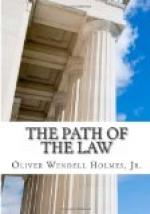So much for the limits of the law. The next thing which I wish to consider is what are the forces which determine its content and its growth. You may assume, with Hobbes and Bentham and Austin, that all law emanates from the sovereign, even when the first human beings to enunciate it are the judges, or you may think that law is the voice of the Zeitgeist, or what you like. It is all one to my present purpose. Even if every decision required the sanction of an emperor with despotic power and a whimsical turn of mind, we should be interested none the less, still with a view to prediction, in discovering some order, some rational explanation, and some principle of growth for the rules which he laid down. In every system there are such explanations and principles to be found. It is with regard to them that a second fallacy comes in, which I think it important to expose.
The fallacy to which I refer is the notion that the only force at work in the development of the law is logic. In the broadest sense, indeed, that notion would be true. The postulate on which we think about the universe is that there is a fixed quantitative relation between every phenomenon and its antecedents and consequents. If there is such a thing as a phenomenon without these fixed quantitative relations, it is a miracle. It is outside the law of cause and effect, and as such transcends our power of thought, or at least is something to or from which we cannot reason. The condition of our thinking about the universe is that it is capable of being thought about rationally, or, in other words, that every part of it is effect and cause in the same sense in which those parts are with which we are most familiar. So in the broadest sense it is true that the law is a logical development, like everything else. The danger of which I speak is not the admission that the principles governing other phenomena also govern the law, but the notion that a given system, ours, for instance, can be worked out like mathematics from some general axioms of conduct. This is the natural error of the schools, but it is not confined to them. I once heard a very eminent judge say that he never let a decision go until he was absolutely sure that it was right. So judicial dissent often is blamed, as if it meant simply that one side or the other were not doing their sums right, and if they would take more trouble, agreement inevitably would come.
This mode of thinking is entirely natural. The training of lawyers is a training in logic. The processes of analogy, discrimination, and deduction are those in which they are most at home. The language of judicial decision is mainly the language of logic. And the logical method and form flatter that longing for certainty and for repose which is in every human mind. But certainty generally is illusion, and repose is not the destiny of man. Behind the logical form lies a judgment as to the relative worth and importance of competing legislative




